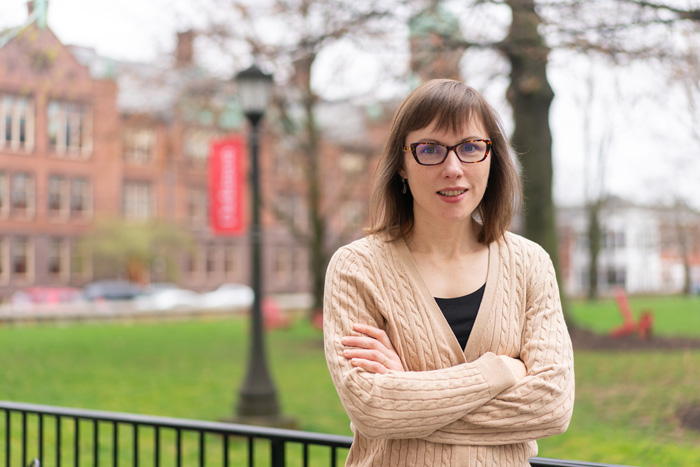The Vast Bounty of Literature and Film and Media

Associate Professor of English Siobhan Phillips outside East College, home of the Department of English. Photo by Dan Loh.
OFFICE HOURS: Siobhan Phillips, Associate Professor of English
by Tony Moore
A Rhodes Scholar, Associate Professor of English Siobhan Phillips earned her Ph.D. at Yale University. She teaches American literature of the 20th and 21st centuries, creative writing and food studies, with courses such as Letters & Literature and U.S. Poetry of the Modernist Era. She has published a scholarly study, The Poetics of the Everyday, and a novel, Benefit, as well as essays, poems and articles in various journals.
Apropos of nothing, the literature you teach is more or less where my concentration was as an English major (minus food studies, which wasn’t a thing in the 1940s). Why is Dickinson the place for those students who want to drag a fine-toothed comb through the works of some giants of American literature—and maybe one day join them?
We start with the questions and methods that guide our field and make sure students can use those to analyze anything in the vast bounty of literature and film and media they might need and want to understand. Literature is changing and growing all the time. So the Dickinson approach helps our courses evolve and expand, even as we’re constantly returning to the core of what literary scholars do: clarify how texts create meaning and beauty, find more of both, connect both to the deepest questions of human culture in various other times and places as well as our own. This is great preparation for writers, too! I’m not saying anything at all controversial, but reading well, reading a lot, is essential training. And can I put in a plug for Dickinson’s commitment to the liberal arts? That’s a huge advantage to future writers. The connections students make across courses here—not to mention the great training in language Dickinson emphasizes—are vital for creativity, I think.
Your novel hit the shelves two years ago, and it sounds like it could be more than a little bit autobiographical. What inspired you to write it, and where does your life leave off and fiction take over?
I increasingly think that my scholarly writing may be more autobiographical than my fiction—but of course that’s not really for me to decide! My novel began about 10 years ago in my puzzlement and anger and grief about what happened in our country and world throughout the whole decade between 2001 and 2011. Crafting a story gave shape to my confusion and helped me research more of what I needed to know, so that I could gain some clarity if not to come to many conclusions. I was surprised, and even excited—also of course heartbroken and infuriated—at what I found and where it all led. I did a lot of research about war, which I have been fortunate enough to know personally only in the most attenuated ways. But I also ended up requesting privately printed biographies of 19-century sugar executives and exchanging emails with a colleague in geosciences about fossil hunting a hundred years ago.
“English” as an area of study conjures a lot of ideas, as it’s such a multifaceted, possibly often nebulous realm. What facet(s) drew you to it, and what do you want your students to take from your approach to the discipline?
It’s just that multiplicity that’s exciting to me—range in subjects of literary study and in what might inform that study. I wouldn’t call it nebulous, though. Texts, books, media—these have such concrete histories, such tangible effects. And then literary analysis—with all the close attention it requires—is such a pointed and definite skill. So are the practices of applying theoretical ideas to the analysis, crafting analytical arguments and putting together cogent, stylish analytical writing. I want my students to be able to do all that when they’re through at Dickinson. I also want them to feel, as I do, that these activities will never be irrelevant or fully achieved. There’s always more to read, to take in, and there’s always more that should be shaping or deepening our reading. There are always better, truer ways to put what we know and believe into language. I feel truly lucky to have all that as part of my life. And whatever else they take up, I want Dickinson English students to feel a similar joy and purpose in a lifetime of reading and writing.
TAKE THE NEXT STEPS
Published April 15, 2024